Creators: David Benioff & D. B. Weiss
Year: 2016
Runtime: 60-82 minutes / episode
Rating: 9/10
“I choose violence.”
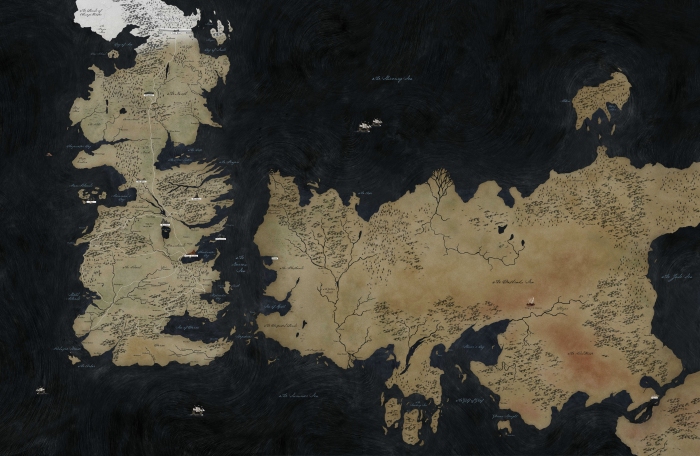
The multitudes of plotlines, characters, mythology and backstories makes it challenging to review just a single episode of Game of Thrones, let alone an entire season. This review, therefore, isn’t intended to be comprehensive, but rather to dive into what I consider the most important aspects of the show’s latest season. Newcomers beware: Spoilers are coming.
I’ll use the following characters as starting points, and discuss their arcs and relating plot threads from there: Jon Snow, Sansa, Arya, Tyrion, Daenerys and Cersei. Then follows a discussion of whether the show is softening compared to early seasons, before a collection of random observations conclude the review. Since this is my first time writing about Game of Thrones, I occasionally comment on the series in general.
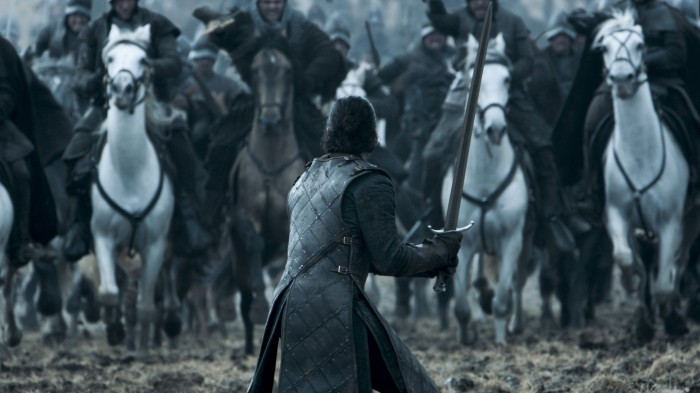
Season six of Game of Thrones, like most of the show’s seasons, showcases both its strengths and weaknesses. It performed the ungrateful task of cleaning up in some of the show’s uninteresting detours, and neatly set the stage for the serie’s sure to be spectacular conclusion. If much of what follows seem like complaining, I’d like to make it clear from the outset that I think Game of Thrones is a spectacular series , and that season six, while not one of the series best, was a solid addition to the show. Game of Thrones is a groundbreakingly ambitious show, both in terms of scale and narrative complexity. Its only because the show mostly succeeds in fulfilling this ambition that one notices every time it doesn’t.
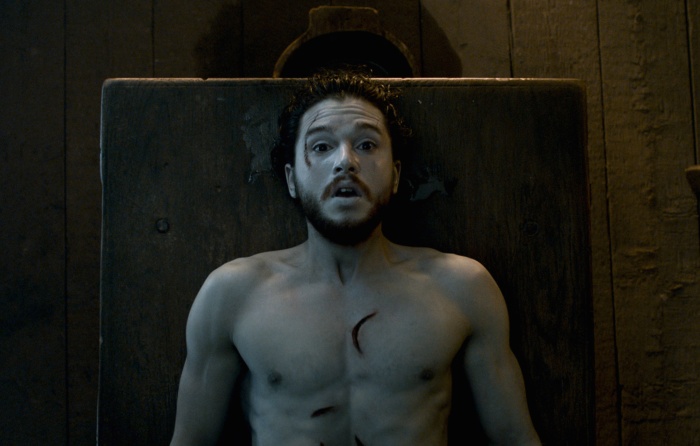
This season picked up right where number five left off, with Jon Snow’s death at the Wall. I’m not sure how everyone knew he’d be resurrected in advance, but they were all proven right rather quickly. Kit Harrington’s performance sold the moment well and the resurrection was set up properly in previous seasons, even if his return didn’t have the shock value it was intended to. Earlier episodes established that red priest(esses) posses the power to bring characters back from the dead, but even if this meant that Snow’s return wasn’t a deus ex machina, it doesn’t necessarily mean it was a good idea, either. Bringing characters back from the dead usually renders the death in question weightless, and lessens the stakes of future deaths in the story. The only way to circumvent this problem is by having the resurrection be such a mistake that the characters clearly would never attempt it again, (as seen in season six of Buffy the Vampire Slayer), but as a Melisandre admits in episode nine, she would try to resurrect Snow again if he died. Both Kit Harrington and the showrunners Weiss and Benioff commented in interviews on the necessity to make Jon Snow different and somewhat damaged but they didn’t follow through on this.
After his return, Snow spend the bulk of this season preparing for the glorious Battle of the Bastards in episode nine. That episode was a curious one for Game of Thrones. The show has traditionally avoided black and white morals in favour of morally grey characters, but in Battle of the Bastards, a stereotypical knight in shining armor faced pure evil. This, in combination with Ramsay’s death that felt too satisfying*, and the great mystery of why Sansa didn’t let Snow know that reinforcements were on the way, could easily have ruined the episode that probably consumed half the season’s budget. Miguel Sapochinik’s direction, however, saved this episode. Game of Thrones is mostly a show that excels in its writing, but in this episode the stellar directing elevated the material by magnitudes. The shot from behind Jon Snow as the horses charge towards him is the most powerful shot of the entire series, and the battle continued to impress throughout, whether it was with the long continues shot in the beginning of the fight, or the rapid editing later, as Snow was almost trampled to death (a moment which was improvised. For more behind the scenes details on the making of this episode, I strongly recommend this in-depth interview with Sapochinik). Ramsay has long been the series’s worst character, so despite my misgivings on how it happened, I was happy to see him go.
* Laura Hudson wrote a poignant article about this. In brief, she argues that by enjoying watching Ramsay’s violent death, we all become more like Ramsay ourselves.
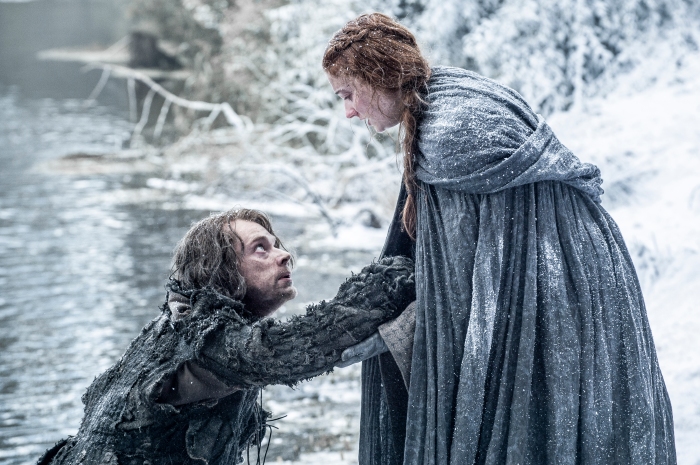
It was rather disappointing the see that neither Theon nor Sansa suffered even a sprained angle, after jumping off a high wall at the end of season five. This was a clear case of the showrunners wanting to end their story on a cliffhanger last year, and then not following through on that.
After her escape, Sansa had very little to do this season, except for keeping secrets from Jon for no reason. That being said, it’s been incredibly satisfying to see her luck shift. Going straight from the arms of Joffrey to Ramsay has to be the worst run of bad partners ever experienced by a human being, so she deserved an uplifting season. Seeing her reunite with Theon in the beginning and Jon later on, and seeing her with personal agency (fighting to reclaim Winterfell) and victorious in this regard, all felt incredibly just.
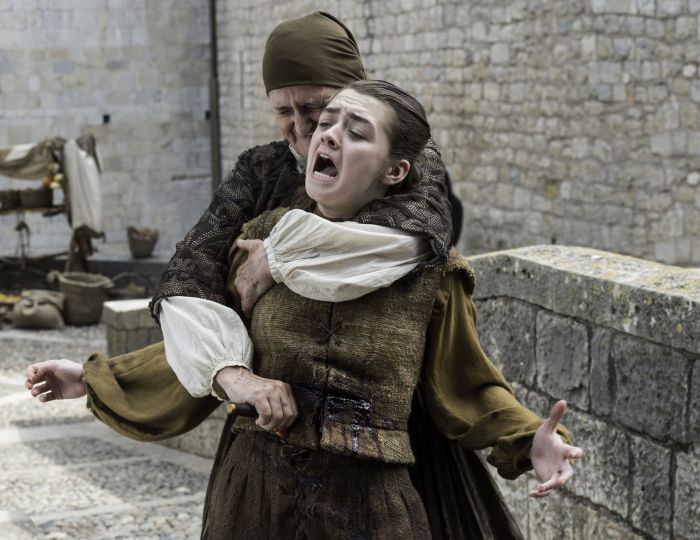
Arya, who was one of my favorite characters for a long time, finally concluded her abysmal subplot as an assassin-trainee at the House of Black and White. She’d been stuck here since the beginning of season five, and while I initially was thrilled to see her reunite with Jaqen H’ghar, this story unfolded in such a mysterious, repetitive and nonsensical way, I quickly started rolling my eyes whenever the show cut back to her. There was only enough material here to cover 4-5 episodes, but it seems Weiss and Benioff considered her too important a character to only check in with her rarely for a two-season stretch.
The theatrical play based on previous season’s events in King’s Landing was pure joy, and by far the best thing to come out of this plot thread. Arya’s two fights with the Waif, however, were riddled with logical inconsistencies. In the first encounter, why was Arya just strolling along the streets of Bravos, instead of hiding? She had to know there’d be consequences to her abandoning her mission. Why didn’t she carry her sword, which the show had just made a big deal of her reclaiming? Why didn’t she put on a fake face to hide? When the Waif finally found her, why didn’t the Waif kill her properly? The Waif’s been a assassin for even longer than Arya, so how could she make such a blunder? In the second encounter, Arya started the episode barely alive, but was soon running around doing parkour, falling from fatal heights, and merrily springing along afterwards. The climactic battle to end this story happened off-screen, and was followed by an annoying final encounter with H’ghar, which vaguely suggested that whatever happened, this was H’ghar’s plan all along. At least we finally got Arya back to Westeros in the last episode, and in spectacular fashion: the Frey-pie scene is the best moment Arya has been a part of since she left the Hound.

Tyrion is another favorite character that has been stuck since the beginning of season five. The boring nature of his journey to Meereen was one-upped by how the tediousness of his scenes after arriving. It was a small ray of light to see him reunite with Varys, but their moments together were few and far between, and Tyrion’s scenes Greyworm and Missandei were mostly cringe worthy (despite Peter Dinklage’s valiant effort to save the poor writing). It was also baffling to see Tyrion release the dragons early in the season, and never have this set-up pay off. Episode nine when Daenerys returns to Meereen would’ve been a good occasion to have the two dragons burst out of the sky, but instead they burst out of the cave, which means that when Tyrion removed their chains because he thought they should be liberated, they weren’t liberated at all. Tyrion’s political failure in Meereen was also deeply unsatisfying, and without any set-up: This is where he usually excels. Like with Arya, however, the last episode gave Tyrion a good scene, when Daenerys names him hand of the queen. And, like with Arya, he’s finally heading back towards Westeros and our main story again.
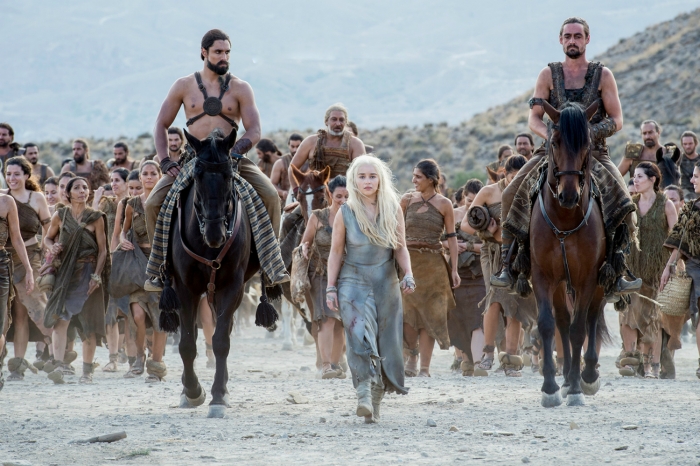
Daenerys has always been the show’s weakest lead-character. Her character is thinly written, and her arcs from season to season are dreadfully repetitive: She wanders the desert, gives some speeches, and overpowers impossible odds with her dragons. As Joanna Robinson points out, the last four seasons with Daenerys has been a waste of time. To exacerbate matters, Emilia Clarke is leagues below the show’s other actors. She has no interior life, and her character never seems to feel any emotion, which makes it hard for the audience to care about her. She simply has the same blank expression on her face all the time. This season was no different, and the execution of her two set-pieces (when she burned herself along with the Dothraki leaders, and when she returned to Meereen), fell flat in my eyes. Regarding the former, I like the idea of Daenerys using her fire immunity to just burn herself along with the Dothraki douchebags, but it seemed so weird that a) none of the Dothraki tried to stop her, b) none of them tried to harm her after she set the house aflame, c) that they were all unable to escape that fragile-looking hut, and d) that the fire spread so violently after being poured onto earth. The scene was simply too unnaturally staged to work as the empowering moment is was designed to be. Her return to Meereen resulted in a boring CGI-escapade with a poor set-up and no real conclusion. Amidst all this disappointment, however, she had at least three truly great scenes this season. The first was when she said goodbye to Jorah. The scene was elegant, moving, showcased how great Iain Glen (who plays Jorah) is, and was one of Emilia Clarke’s better moments as well. Secondly, her feministic scene with Yara Greyjoy was pure joy, and finally there was her aforementioned scene with Tyrion.
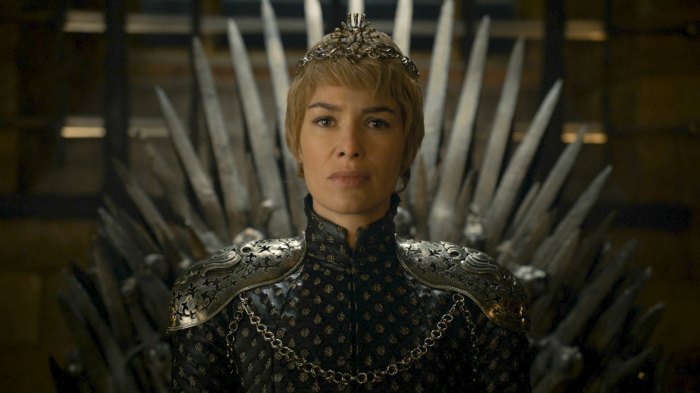
As I lost my affectations for Arya and Tyrion the past two seasons, Cersei grew into one of the show’s most interesting characters. She’s as ruthless as she is ambitious, but in the Lannister vs. the High Sparrow battle, I easily rooted for Cersei after her walk of atonement. This subplot perfectly showcases what Game of Thrones does better than any show before it: having your alliances shift between complex, three-dimensional characters. The High Sparrow plotline lasted the perfect amount of time too. It’d been great so far, but felt like it should end soon. And end it did, in a such a spectacular manner that many deemed the season finale the best episode ever of Game of Thrones. It’s definitely up there for me, and together with the brilliant episode nine, this episode completely redeemed what’d otherwise been a slightly lackluster season. After years of teasing Jon Snow’s background, the reveal was powerful and satisfying. While the shot of the horses charging towards Jon Snow is my favorite shot in all the seasons, the cut from baby Snow to adult Snow might be the best cut.
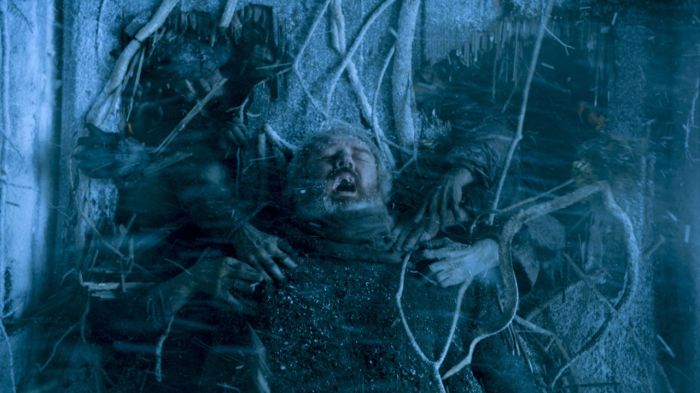
The most memorable episode prior to these two episodes was episode five, “The Door,” where we said goodbye to the beloved Hodor. This episode also included a brilliant encounter between Sansa and Littlefinger, a decent training-montage with Arya, the aforementioned touching goodbye between Daenerys and Jorah, and the introduction of the great new character, Euron Greyjoy, in the Iron Islands. Many episodes that visit too many plotlines feel like they don’t spend enough time in any, and often feels like a mixed bag because of the various degrees of quality in the different plotlines. Both episode five and ten, however, reminds you how great the show can be when all the different plots peaks simultaneously.
While Hodor’s death was an immensely powerful moment, it’s a shame it didn’t have any consequences in later episodes. Game of Thrones contains many spectacular moments, but the overall quality of the show is more dependent on how well the different scenes fit together, than how good they are on an individual basis. The moment when the Waif stabs Arya, for instance, was both powerful and surprising, but was subsequently rendered worthless by how poorly it was followed up.
Viewed in its entirety, however, season six not only contained many strong individual moments, but moved the different pieces of the overall plot into strong positions. Ramsay is gone. Arya is back in Westeros. Tyrion is heading back to Westeros, and so is Daenerys (finally). Cersei now sits on the Iron Throne, which decreases her life expectancy considerably, but is a fascinating development. Season seven may not need the usual 3-4 episodes to get going, but will hopefully hit the ground running.

Part of what originally made Game of Thrones such an exciting show, is that you never felt you had a clue where it was headed. Ned Stark’s death, The Red Wedding, The Purple Wedding, and Tywin Lannister’s death were all major twists that felt surprising beyond belief, but were perfectly set up beforehand. Jon Snow’s death could’ve been the same, but with his resurrection it feels like the show is losing some of the edge that made it great to begin with. In most films and TV-Shows you just expect all your heroes to make it through the big battles, but part of what made Battle of the Bastards so great is that you didn’t feel anyone was safe. Having The Hound, an amazing character whose death I’m sure we all mourned, return, similarly makes it feel like Game of Thrones is starting to become too safe. When it’s all over and we look back, maybe we won’t think of it as a show where anyone could die at any moment, but rather as a show that offed a bunch of major characters early on to have the audience on the edge of their seat as it played it safe in the home stretch. I hope this doesn’t turn out to be the case. The big bang in the season finale helped slightly in this regard, but only slightly. No one who died there were as big or important characters as we’ve lost in most previous seasons, and a single big character weighs more than many smaller ones when it comes to setting the stakes for future episodes.
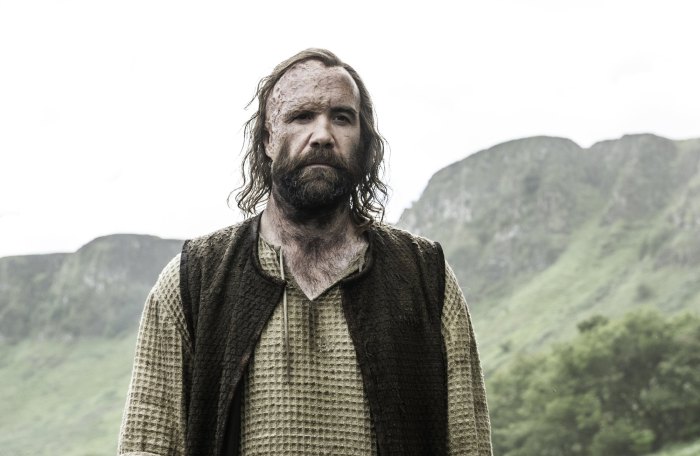
Some closing happy thoughts:
- This season contained the perfect amount of Sam and Gilly. They outstayed their welcome in season five, which is a shame, because they’re such a delightful addition to the show in these small doses.
- Lyanna Mormont is the best new addition to the series, even ahead of Euron Greyjoy. I hope to see much more of both of them in the next season.
- The show continues to look and sound better than anything on TV. It demands being watched on a big screen in a dark room with the volume cranked up to eleven. Ramin Djawadi’s track “Light of the Seven,” which plays in the final episode, is particularly memorable. Listen to it here: https://www.youtube.com/watch?v=kY2evrkfbiM . For an excellent article on why modern TV shows has literary gotten darker, read Matthew Dessim’s excellent piece.
- Whenever the White Walkers have appeared in previous seasons, it’s put me straight to sleep, so I consider it a great strength of season six that they played such a small role this season.
- We also spent precious little time in Dorne. This made no sense, given that the women there murdered the Lannister’s daughter at the end of season 5, and their own prince early in season six, and you would expect some repercussions for these actions. It was much appreciated, though. The less time spent in Dorne, the better.
- The High Sparrow and Margaery shall be missed. Both were fascinating characters realized by brilliant actors. Margaery’s panic in the final episode, as she tried to convince the High Sparrow that they were in danger, is one of my favourite moments of any season.
- It was lovely to see some more of Littlefinger this season. It adds tension to the show when it includes characters whose actions are unpredictable, and few are more so than Littlefinger.
Links:
https://en.wikipedia.org/wiki/Game_of_Thrones_(season_6)#Episodes
https://en.wikipedia.org/wiki/Game_of_Thrones
http://gameofthrones.wikia.com/wiki/Game_of_Thrones_Wiki
http://www.hbo.com/game-of-thrones